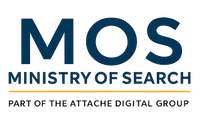Digital PR & Link Building for Law Firms - Earned Authority
Build defensible authority through ethical digital PR and strategic link building. Our SRA-compliant approach transforms your firm's expertise into powerful third-party validation that drives rankings and client trust.
The Authority Mandate: Why E-E-A-T is Non-Negotiable for UK Law Firms
For law firms operating in the United Kingdom's highly competitive digital landscape, the concept of "link building" is an anachronism. It is an outdated term that fails to capture the strategic imperative of the modern search environment and, when pursued with dated tactics, can introduce significant risk.
The contemporary objective is not merely to acquire links but to cultivate Earned Authority: a defensible portfolio of credible, third-party signals that validate a firm's expertise and trustworthiness to both prospective clients and search engine algorithms. This approach is not a matter of preference; it is a direct response to the stringent quality standards Google applies to the legal sector.
The YMYL Gauntlet: Law Firms Under the Microscope
Legal services are unequivocally classified by Google as a "Your Money or Your Life" (YMYL) topic, falling under the categories of "Civics, government, and law." This classification is of paramount importance because Google's systems are designed to apply the most rigorous scrutiny to YMYL content.
The rationale is straightforward: misinformation or low-quality advice in these areas can lead to severe, negative real-world consequences for individuals, impacting their financial stability, safety, and fundamental rights.
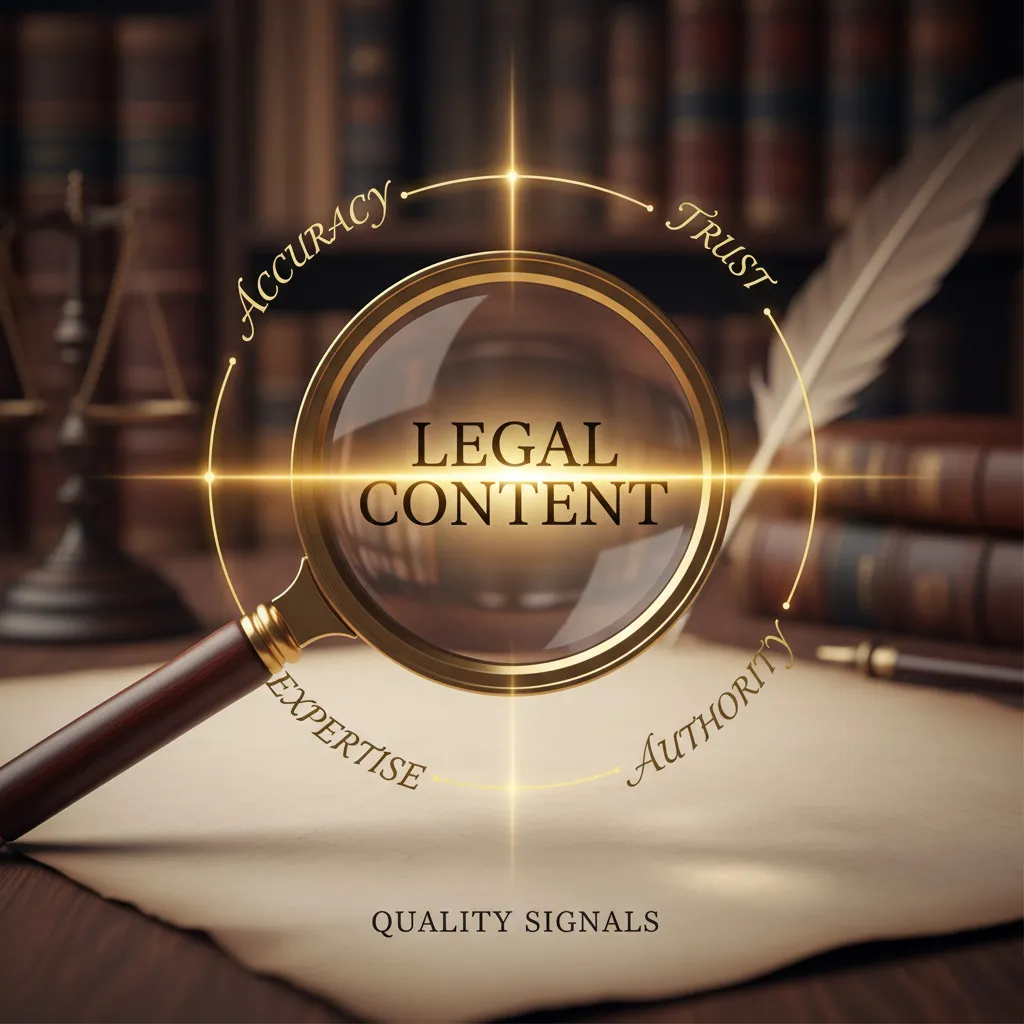
Critical Algorithm Integration
The principles of the "Helpful Content" system, once a separate layer of analysis, are now fully integrated into Google's core ranking processes. For YMYL sites, a critical component of "helpfulness" is the demonstration of robust E-E-A-T. A website with significant content deemed unhelpful or lacking in E-E-A-T can trigger a site-wide classifier, suppressing the visibility of the entire domain, not just the offending pages.
Therefore, building off-page authority is no longer just a strategy for growth; it is a crucial risk mitigation measure to prevent algorithmic demotion.
Decoding E-E-A-T for the Legal Sector
To build Earned Authority, it is essential to understand how each component of E-E-A-T is interpreted within the legal context and how off-page signals are used to validate on-page claims.
Experience
This refers to the demonstrable, first-hand involvement of the content creator in the legal topic at hand. A solicitor writing about conveyancing should have practical experience in property law.
Off-page validation: A press release that generates media coverage of a firm's involvement in a high-profile case serves as powerful, third-party verification of that experience.
Expertise
This relates to the depth of knowledge and skill possessed by the firm's solicitors. Expertise is showcased through insightful blog posts, whitepapers, and comprehensive legal guides.
Off-page validation: A backlink from a respected legal journal or academic publication referencing a firm's analysis is a potent signal of validated expertise.
Authoritativeness
This is a measure of a firm's reputation among its peers and within the broader legal industry. Unlike other E-E-A-T components, authoritativeness is almost exclusively an off-page construct.
Built through: Links and mentions from The Law Society, respected legal directories, university law departments, and major news outlets.
Trustworthiness
Google's guidelines identify Trust as the most important element of the E-E-A-T framework. Trust encompasses the accuracy of information, website security, and transparency of operations.
Off-page signals: A link from a government body or leading legal association confers significant trust, acting as a powerful vote of confidence.
The Ministry of Search Methodology: A Technical Framework for Building Defensible Authority
The term "link building" is often associated with low-quality, transactional tactics that carry more risk than reward. Our sophisticated approach moves beyond simple link acquisition to a structured process of building genuine, defensible authority.
The MOS Authority Blueprint
Our proprietary, four-phase process ensures that every action is strategic, measurable, and aligned with the goal of building lasting authority while maintaining full SRA compliance.
Authority Audit & Asset Discovery
Deep-dive analysis to understand existing E-E-A-T signals and identify what makes your firm inherently link-worthy.
Strategic Campaign Development
Design targeted campaigns to earn authority, shifting focus from soliciting links to creating compelling reasons for coverage.
Compliant & Credible Outreach
Ethical engagement with journalists and editors, respecting editorial integrity and regulatory obligations.
Performance & Impact Analysis
Success measured by tangible commercial impact, including growth in qualified enquiries and organic visibility.
Phase 1: Authority Audit & Asset Discovery
This foundational phase involves a comprehensive audit of the law firm's existing assets, including a meticulous review of on-page E-E-A-T signals, attorney biographies, published case results, and evidence of community involvement.
Linkable Asset Identification
Unique, valuable pieces of information or expertise that can form the basis of outreach campaigns.
Expertise Mapping
Discovery of latent expertise within the firm's collective knowledge base.
Opportunity Development
Identifying opportunities for new assets like expert commentary, proprietary analysis, or detailed guides.
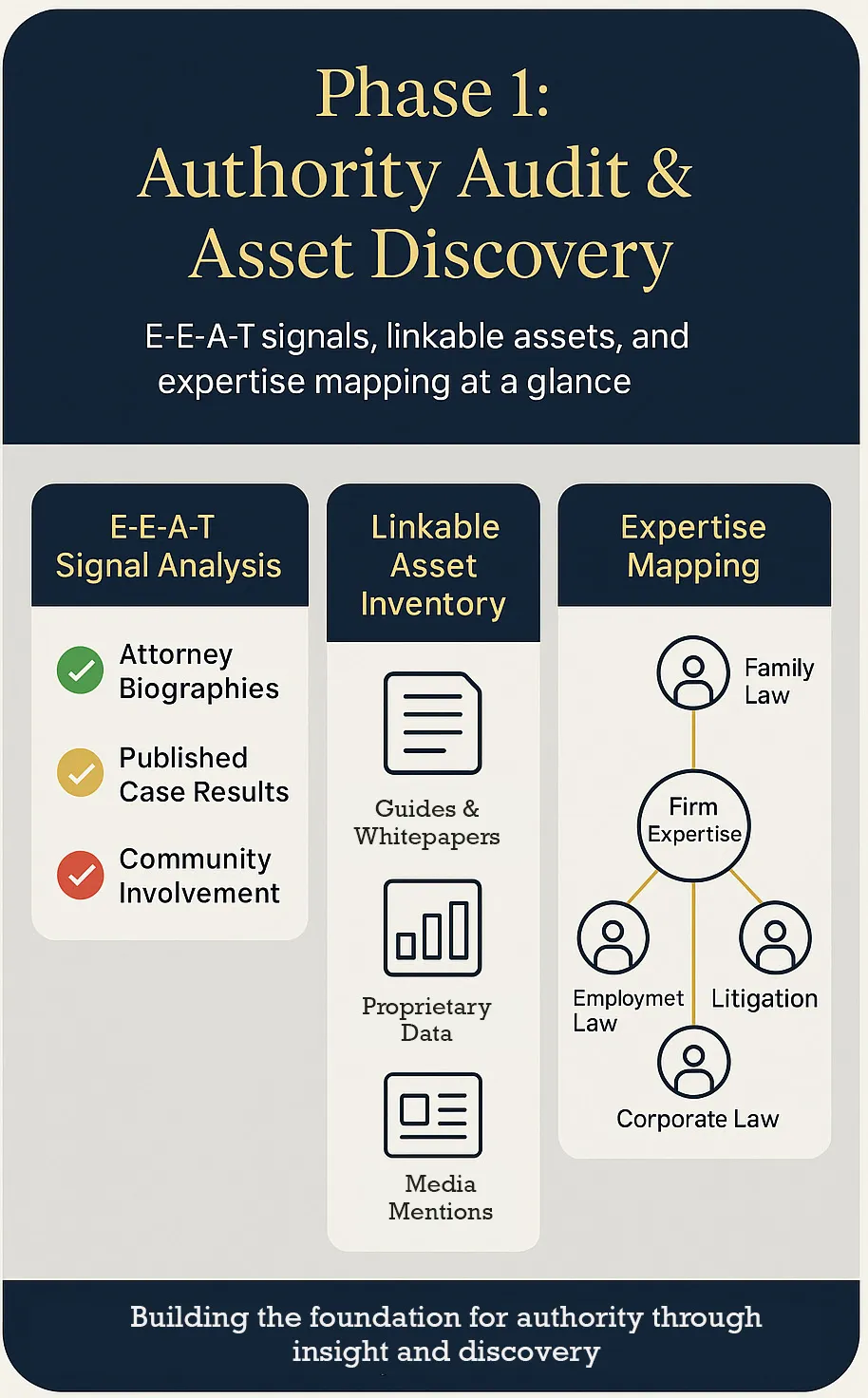
Phase 2: Strategic Campaign Development
Once linkable assets are identified, the focus shifts to packaging this expertise into strategic campaigns. This involves creating compelling narratives that will resonate with journalists, editors, and industry publishers.
Campaign Examples
This approach effectively neutralises the argument that link building has a high opportunity cost. The campaigns create intrinsic brand value, with high-authority links as a measurable outcome of valuable marketing initiatives.
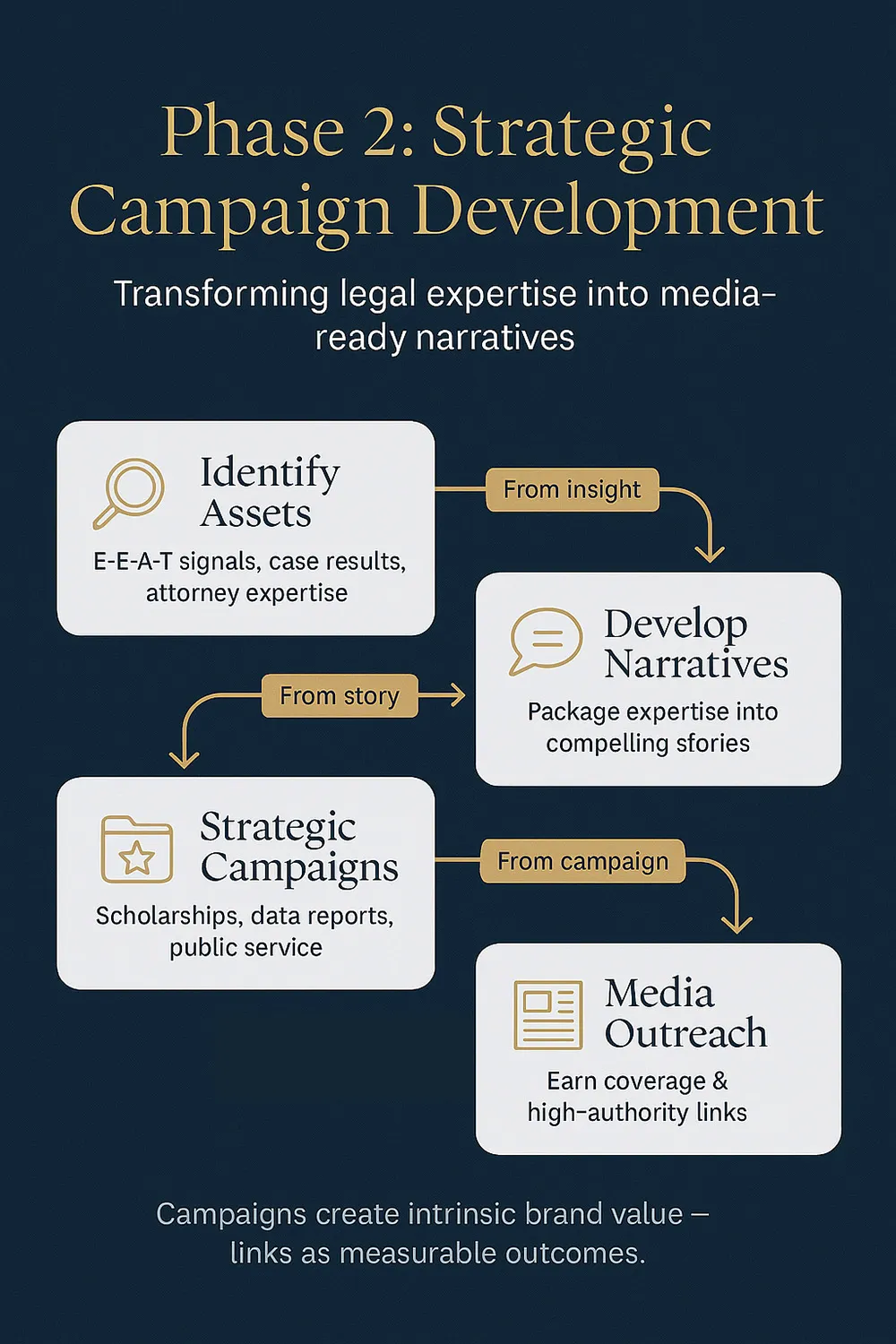
Anatomy of a High-Trust Signal: What Constitutes an Authoritative Link in the Legal Sector
In the high-stakes YMYL legal sector, the principle of quality over quantity is absolute. A single, editorially given link from a top-tier, contextually relevant source can provide more SEO value than hundreds of low-quality links combined.
Source Authority & Trust
Sources with demonstrable editorial standards, strong legal community reputation, and history of accurate content.
Topical Relevance
Links from legal journals, university law departments, relevant case coverage, or practice area-specific blogs.
Audience Alignment
Linking site's audience includes potential clients, referral sources, or legal sector journalists.
Link Profile Diversity
Natural, diverse mix of link types from various reputable sources, avoiding predictable patterns.
E-E-A-T = Experience, Expertise, Authoritativeness, Trust. In legal (a "Your Money or Your Life" category), Google places extra weight on these signals, and treats paid links/link schemes as violations of its spam policies.
Our Standard vs High-Risk Tactics (Plain-English Comparison)
Comparison 1: Expert commentary vs paid guest post
| Criteria | What we do (earned, compliant) | What we avoid (high-risk/low-value) |
|---|---|---|
| Example | Secure a solicitor quote in The Law Society Gazette via genuine media relations. | Pay for a "guest post" on a generic business blog to insert a link. |
| What it is | Editorial coverage earned on merit and relevance to the legal topic. | A transactional placement with little editorial oversight or legal relevance. |
| Impact on E-E-A-T | Strong — recognised legal publication builds Authoritativeness and Trust. | Weak/negative — resembles a link scheme; likely discounted by Google. |
| SRA / compliance risk | Low — transparent editorial mention; no consumer solicitation. | Moderate — paid placements must be clear; undisclosed advertorial can mislead. |
| Commercial impact | Builds credibility, relevant referral traffic and durable rankings; reusable in BD/PR. | Minimal SEO value; brand risk; may require clean-up work later. |
Comparison 2: University (.ac.uk) mention vs mass directory submissions
| Criteria | What we do (earned, compliant) | What we avoid (high-risk/low-value) |
|---|---|---|
| Example | Earn an editorial mention on a university law clinic page (e.g., sponsoring a student competition programme). | Submit to hundreds of low-quality, generic web directories. |
| What it is | Genuine academic/community partnership with clear public interest. | Volume-driven listing tactic with no editorial standards. |
| Impact on E-E-A-T | Strong — high-trust third-party endorsement from an academic domain. | Negative — spam-like pattern Google devalues. |
| SRA / compliance risk | Low — transparent community engagement and attribution. | Low–moderate — can mislead about standing; wastes resources; may need removal. |
| Commercial impact | Enhances local reputation, attracts talent, and provides a durable SEO asset. | No meaningful traffic or authority; possible future removal/disavow costs. |
The Pillars of Our Digital PR Strategy for Law Firms
An effective authority-building strategy requires a multi-faceted, portfolio approach. It integrates several strategic pillars that work in synergy to build national, local, and practice-area-specific authority.
Content-Led Authority Campaigns
The Engine of Authority Building
This pillar is centered on the creation of unique, high-value "linkable assets" that journalists, editors, and other industry publishers have a genuine reason to cite and reference.
Proprietary Data Reports
Conducting and publishing research, such as analysis of local court records to identify commercial litigation trends or surveys on public perceptions of new legislation.
Definitive Legal Guides
Developing comprehensive, long-form resources on complex legal topics that become the go-to reference for both public and professionals.
Expert Commentary on Legislative Changes
Rapid-response protocol to produce and pitch insightful analysis on breaking legal news, positioning solicitors as timely experts.
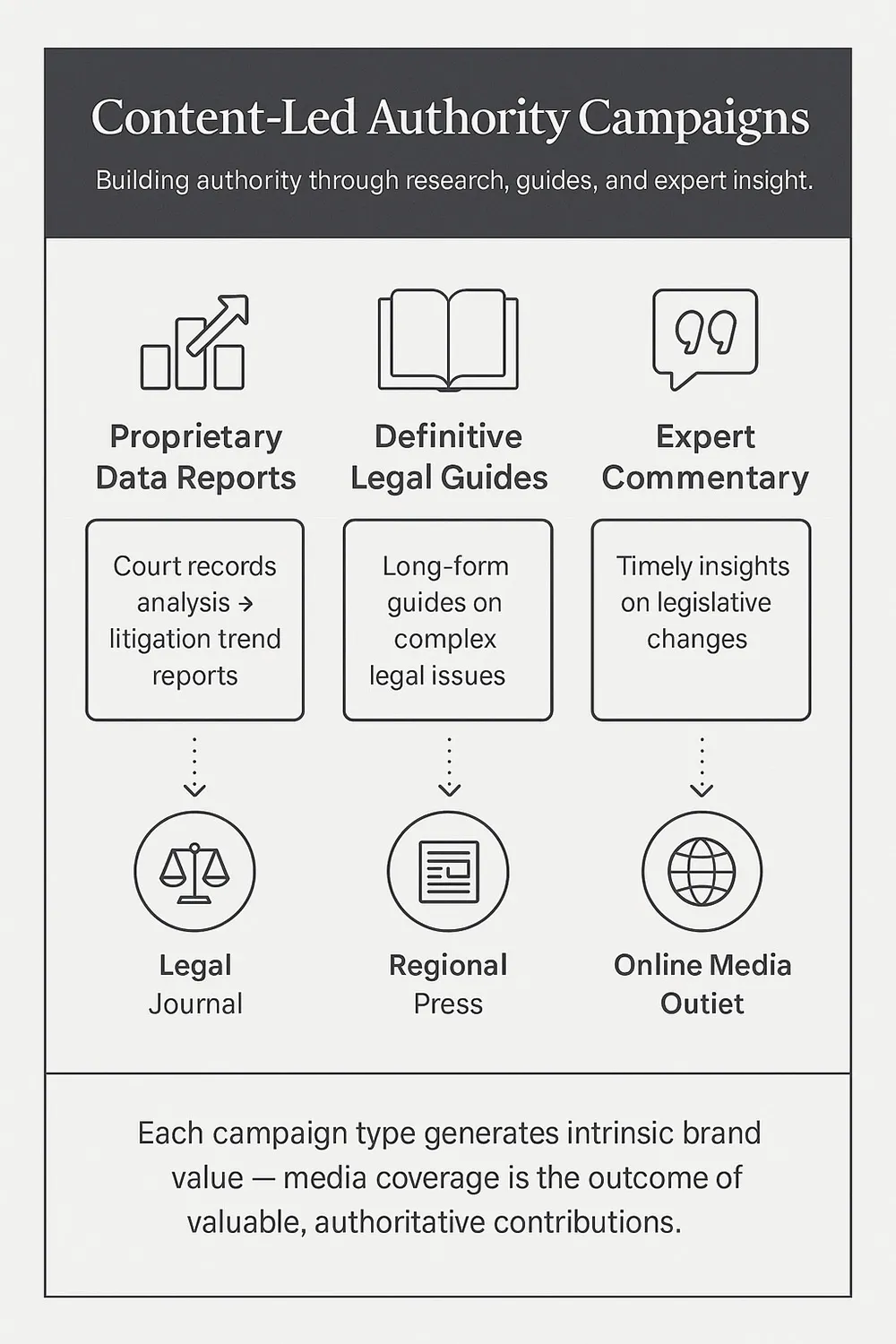
High-Tier Media & Legal Publication Relations
Proactive Digital Public Relations
This pillar focuses on proactive digital public relations and media outreach to secure placements in the most credible and influential publications, requiring deep understanding of the UK media landscape.
Target Publications
Targeted Pitching
Identifying and pitching story ideas, data, and expert commentary to specific high-value UK publications.
Journalist Resource Platforms
Using platforms like HARO to connect solicitors with journalists seeking expert legal sources.
Thought Leadership Positioning
Establishing individual solicitors as go-to media commentators in specific practice areas.
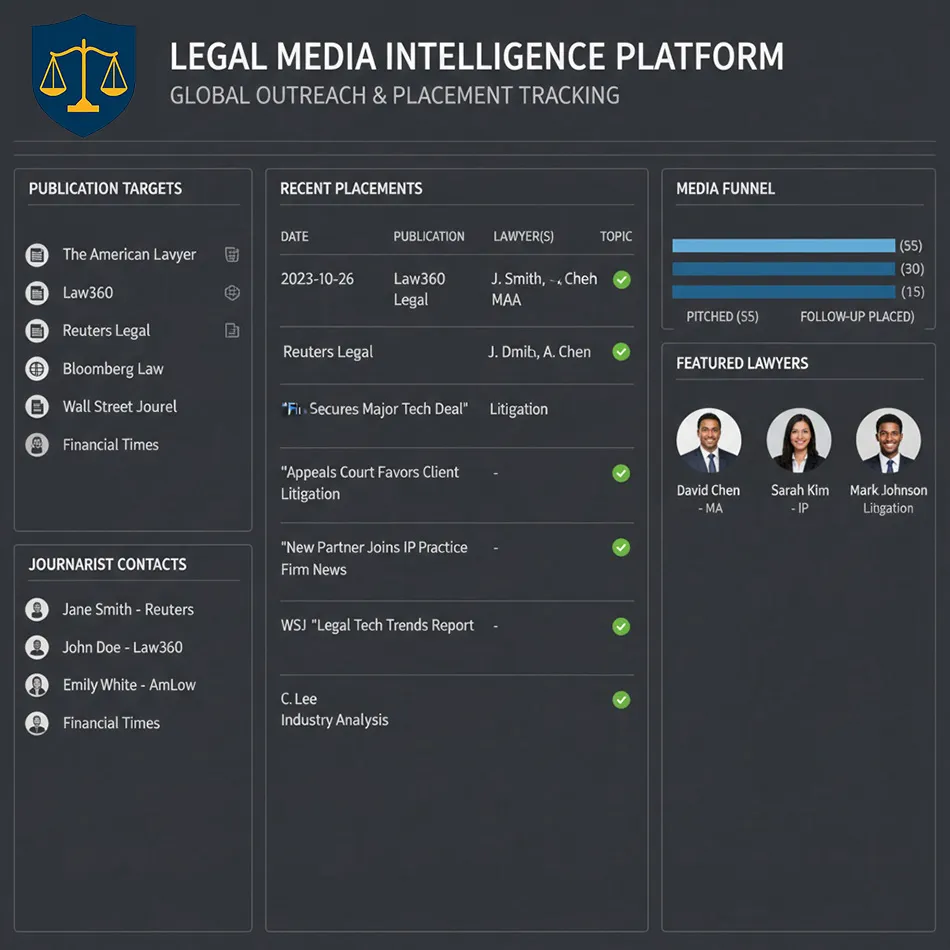
Hyper-Local & Community Authority
Building Geographic Relevance
For most law firms, a significant portion of their client base comes from their immediate geographic area. Building authority at the local level is critical for success in local search results and the Google Map Pack.
Community Engagement and Sponsorships
Sponsoring local charities, youth sports teams, or cultural events, resulting in valuable backlinks and local press mentions.
Educational Partnerships
Collaborating with local universities and law schools through guest lecturing, internships, competitions, or scholarships for coveted .ac.uk domain links.
Local Events and Seminars
Hosting free legal clinics or informational webinars, partnering with Chamber of Commerce to promote and earn relevant local links.
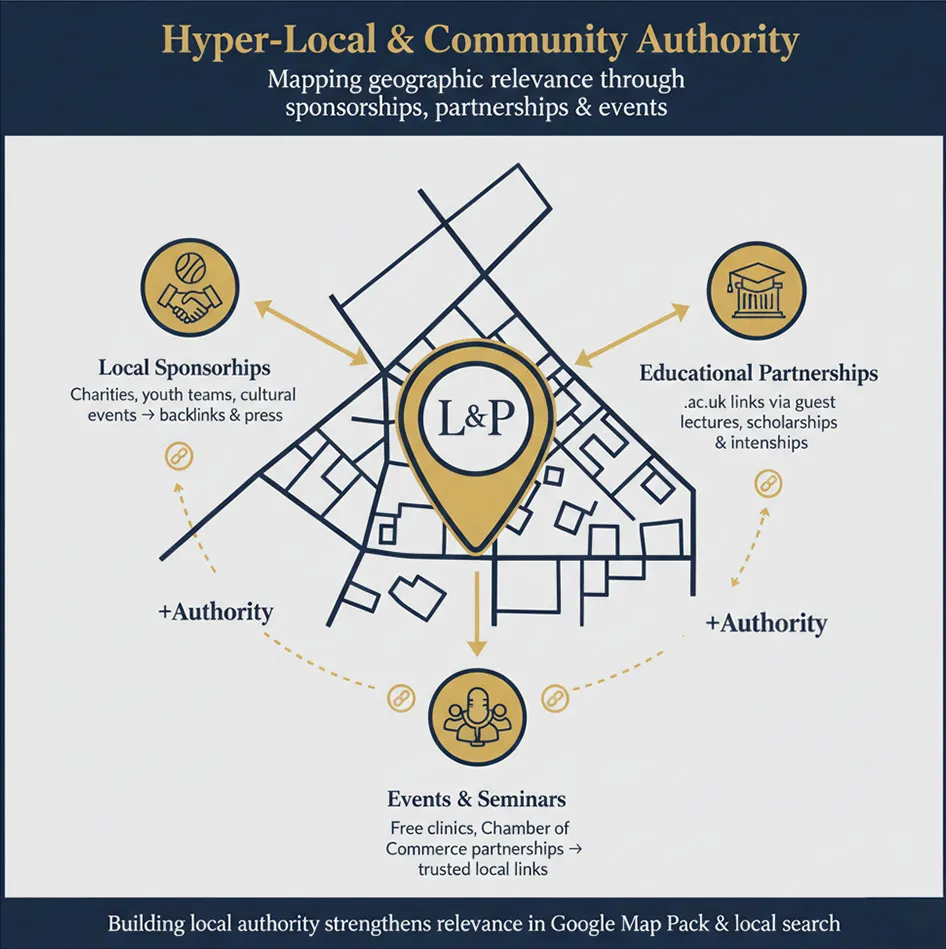
Foundational Authority & Directory Optimisation
Elite Directory Presence
While creative campaigns drive significant growth, a strong foundation of trust signals is essential. This pillar involves securing and optimising profiles in the most elite and respected legal directories.
Elite UK Legal Directories
The focus is not on mass submission but on meticulous optimisation. This approach is deliberately positioned as the antithesis of submitting to hundreds of low-quality directories—a practice that creates a spammy link profile.
Strategic Contrast: We avoid low-quality, generic directories that can actively harm search visibility and require costly removal efforts.
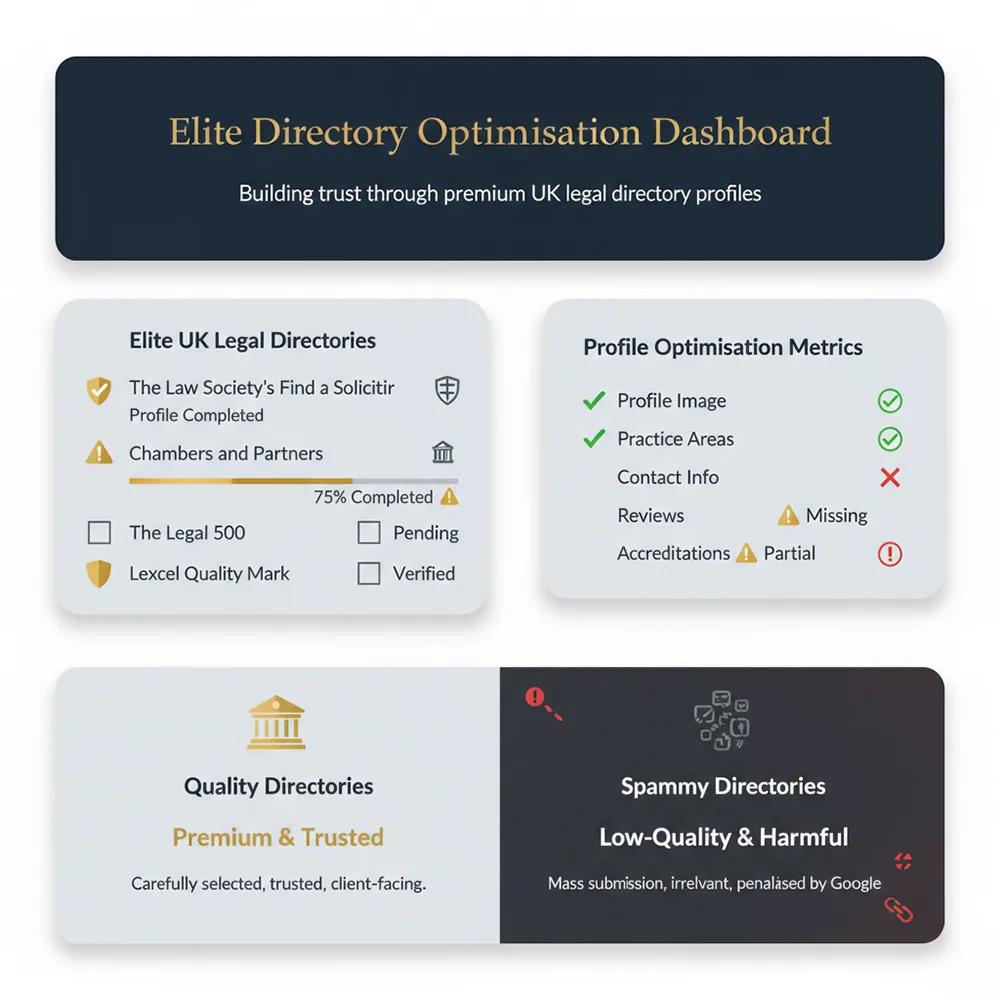
Our SRA Compliance & Ethical Commitment: Building Authority, Responsibly
A law firm's professional reputation is its most valuable asset. All digital marketing activities must be conducted within the strict ethical and regulatory framework established by the Solicitors Regulation Authority (SRA).
How Our Process Aligns with SRA Principles
Every tactic and process is vetted against the SRA's advertising rules to ensure responsible and ethical execution. This commitment to compliance is not a footnote; it is a core component of the service.
No Misleading Claims
All content is rigorously checked to ensure it is factual, substantiated, and avoids exaggerated claims about success rates or "guaranteed outcomes."
No Prohibited Unsolicited Approaches
All outreach is directed at professional editors and journalists for editorial mentions based on expertise—this is media relations, not direct-to-consumer advertising.
Transparency and Professionalism
Campaigns showcase genuine expertise and provide value, avoiding sensationalism, fear-mongering, or undue pressure tactics.
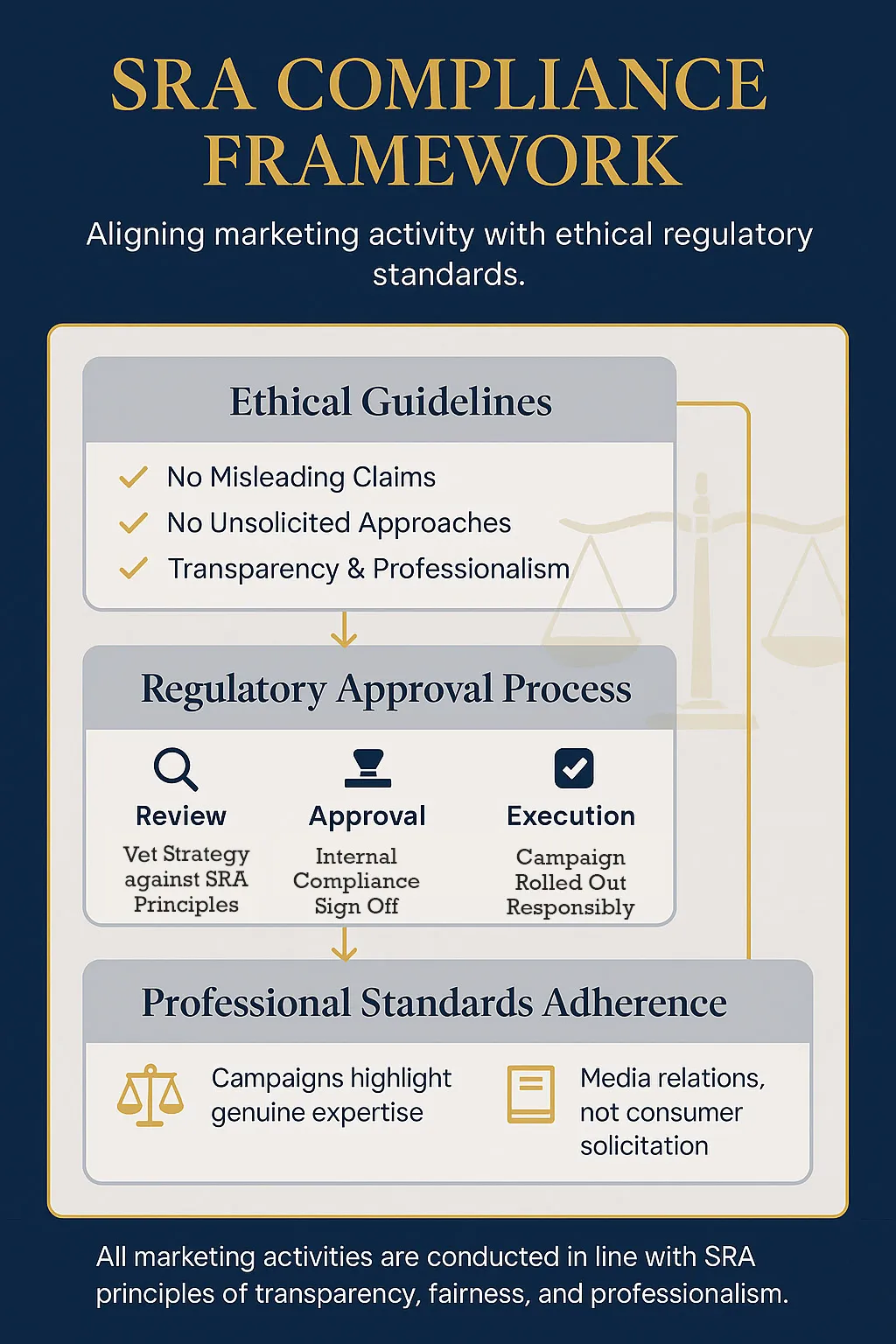
Strategic Partnership, Not Simple Transaction
By demonstrating deep and specific understanding of SRA rules, we establish a level of trust that non-specialist agencies cannot replicate. This reframes the engagement from a simple marketing transaction to a strategic partnership focused on growing the firm's authority while rigorously protecting its professional standing.
Risk-Averse
Understanding law firm partners' professional obligations
Compliance-First
Every strategy vetted against SRA Code of Conduct
Professional Standards
Protecting and enhancing professional reputation
Measuring What Matters: From Authority Signals to Client Enquiries
While the acquisition of high-quality links and mentions is a key activity, these are intermediate metrics. The ultimate measure of success is contribution to the firm's commercial objectives.
Commercial KPIs That Drive Growth
Growth in Organic Visibility
Monitoring search engine rankings for high-intent legal service keywords most likely to convert into client enquiries.
Qualified Referral Traffic
Measuring volume and quality of traffic arriving directly from secured authoritative links and mentions.
Branded Search Volume Growth
Tracking users searching directly for the law firm's name—strong indicator of growing brand awareness and reputation.
Contribution to Leads and Enquiries
Using analytics and call tracking to correlate authority-building with increased contact forms, calls, and new signed matters.
Transparent Reporting for Law Firm Partners
All clients receive regular, transparent performance reports designed for law firm partners, translating complex SEO data into clear, concise business insights.
Custom Dashboard Features
Partner with a Specialist to Build Your Firm's Lasting Authority
In today's legal market, your firm's digital authority is inseparable from its overall reputation and commercial success. Generic, one-size-fits-all SEO tactics are no longer sufficient and can introduce unacceptable levels of risk.
Sustainable growth requires a specialist partner who understands the unique challenges and opportunities of the UK legal sector.
Specialist Focus
Exclusively serving UK law firms
E-E-A-T-Led Methodology
Technical framework for YMYL success
SRA-Compliant Practices
Unwavering commitment to ethical standards
Commercial Results
Focus on measurable business outcomes
